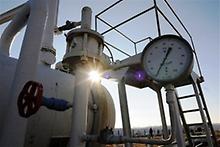Extensions of as much as 20 years on the operating permits held by the country’s three gas supply companies (EPA) operating in the wider Athens area Thessaloniki, and Thessalia, in the mid-northeast, in exchange for an end to their regional monopolies that had previously been agreed, is one of the options being examined at the Environment, Energy & Climate Change Ministry.
Such a solution could stretch the expiry dates on current permits as far as 2050, from 2030. No final solution has yet been reached. At present, crucial draft bill details are being added and taken away along the way to a finalized plan, which, according to sources, will be forwarded for public consultation tomorrow.
Other pending details, such as softer tax terms for the EPA companies, as part of the exchange deal to compensate for their loss of regional monopolies, are currently being discussed.
The longer-lasting permits, a solution that had been anticipated, may also be complemented by geographical extensions, according to sources.
Because of time pressure being applied by the country’s creditors, or troika, for swift progress of the gas market revisions, the draft bill expected to emerge tomorrow will offer general principles describing the gas market’s new landscape as a result of the separation of control of distribution networks and supply. These principles will be made more specific through ensuing ministerial decisions and revisions.
The changes being made will allow for entries by new players into the gas supply market, breaking the monopolies held by the three existing EPA companies. DEPA, the Public Gas Corporation, holds majority 51 percent stakes in all three EPA companies. Shell holds a 49% stake in the broader Athens region, while the Italian multinational Eni holds 49% stakes in the Thessalia and Thessaloniki operations.
To be able to compete successfully, the new firms will need to have access to gas at price levels lower than those offered to DEPA. This could be achieved through LNG orders, or the Trans Adriatic Pipeline (TAP) route. The latter option, however, will not be possible until 2019 onwards, when development of the TAP pipeline project is expected to be completed. Only then will competition in the retail gas market truly intensify as, at present, fixed supply sources are limited.
That said, an agreement, for example, with Algeria, for lower-priced gas supply through regular shipping deliveries could also work as a market entry solution for new players.





